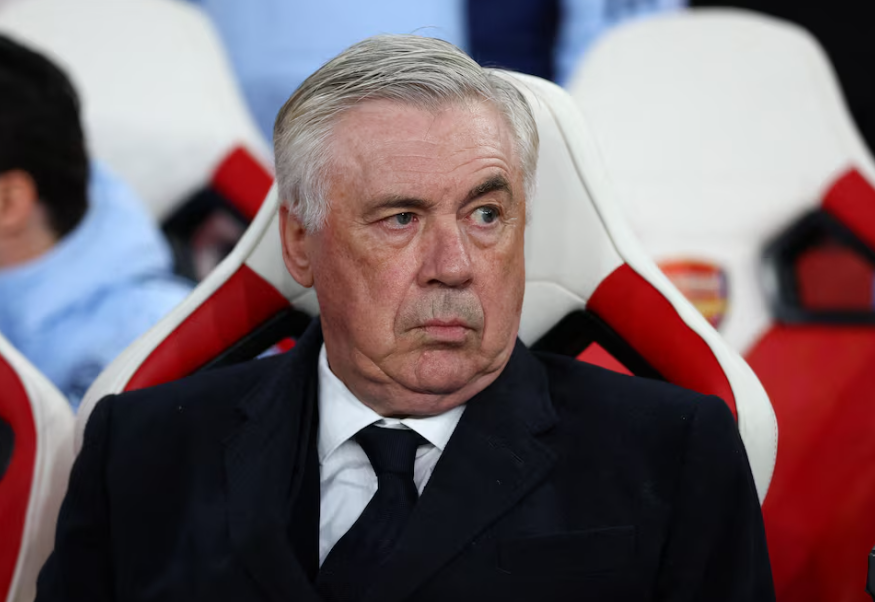Real Madrid, a club synonymous with success, now faces a pivotal moment. Following a humbling 3-0 defeat to Arsenal in the Champions League quarter-final first leg, the team is at a crossroads. Manager Carlo Ancelotti is tasked with reigniting the squad’s spirit as they prepare to confront Alaves. This article delves into the challenges Real Madrid faces, the strategies Ancelotti might employ, and the broader implications for the club’s future.
Table of Contents
The Aftermath of the Arsenal Defeat
The recent loss to Arsenal has sent shockwaves through the Real Madrid camp. The team’s performance was lackluster, with defensive frailties exposed and offensive efforts stifled. This defeat not only jeopardizes their Champions League aspirations but also raises questions about the squad’s resilience and tactical approach.
Defensive Vulnerabilities Uncovered
Throughout the match against Arsenal, Real Madrid’s defense appeared disjointed. The backline struggled to cope with Arsenal’s high press and quick transitions. Individual errors and a lack of cohesion contributed to the concession of three goals, leaving fans and analysts concerned about the team’s defensive solidity.
Offensive Stagnation
On the offensive front, Real Madrid lacked creativity and penetration. The midfield failed to supply the forwards with quality opportunities, resulting in a toothless attack. Star players were isolated, and the team’s build-up play was predictable, making it easier for Arsenal to neutralize their threats.
Ancelotti’s Tactical Dilemmas
Carlo Ancelotti, known for his tactical acumen, now faces the challenge of addressing the team’s shortcomings. Balancing the need for defensive stability with offensive fluidity is paramount. Ancelotti may consider adjusting formations, perhaps shifting to a more compact midfield to provide additional defensive cover while enabling quicker transitions to attack.
Potential Formation Adjustments
A possible shift to a 4-2-3-1 formation could offer more defensive solidity. By deploying two holding midfielders, the defense would receive additional protection, allowing the full-backs to engage more confidently in offensive duties. This setup could also facilitate better link-up play between the midfield and attack.
Player Rotation and Morale
Managing player fatigue and morale is crucial during this period. Ancelotti might rotate the squad to keep players fresh and motivated. Giving opportunities to fringe players could inject new energy into the team and foster healthy competition for starting spots.
The Psychological Impact of Recent Results
The string of poor results has undoubtedly affected the team’s confidence. Building mental resilience is as important as tactical adjustments. Ancelotti and his coaching staff need to work closely with the players to rebuild their self-belief and focus.
Leadership on and off the Pitch
Senior players have a pivotal role in guiding the team through this challenging period. Their experience and leadership can help unify the squad and set the tone for a collective response to adversity.
Fan Expectations and Pressure
Real Madrid’s fanbase is accustomed to success, and their expectations add pressure to the team’s recovery efforts. Transparent communication and visible commitment on the field are essential to maintain supporter trust and patience.
The Road Ahead: Fixtures and Implications
The upcoming match against Alaves is more than just an opportunity to earn three points; it’s a chance to demonstrate resilience and intent. A convincing performance could serve as a catalyst for a positive run in the remaining fixtures.
Navigating a Packed Schedule
With multiple competitions still in play, squad management becomes critical. Ancelotti must strategize to optimize performance across all fronts, ensuring that the team remains competitive and minimizes the risk of further injuries.
Long-Term Considerations
Beyond immediate results, this period offers an opportunity to assess the squad’s composition and identify areas for reinforcement in upcoming transfer windows. Building a team capable of sustained success requires both short-term fixes and long-term planning.
FAQs
Q: What led to Real Madrid’s defeat against Arsenal?
A: The defeat was due to defensive errors, lack of offensive creativity, and failure to cope with Arsenal’s pressing game.
Q: How might Ancelotti adjust the team’s tactics?
A: He may consider changing formations to bolster defense and improve transition play, as well as rotating the squad to maintain player freshness.
Q: What is the significance of the match against Alaves?
A: It’s crucial for rebuilding confidence, gaining momentum, and staying competitive in the league standings.
Q: How can the team address psychological challenges?
A: Focusing on mental resilience, fostering leadership within the squad, and maintaining open communication with fans are key strategies.
Q: What are the long-term implications of the current situation?
A: It highlights the need for strategic squad planning and potential reinforcements to ensure future competitiveness.
Conclusion
Real Madrid’s current challenges test the club’s character and resilience. Under Carlo Ancelotti’s guidance, the team has the opportunity to learn from setbacks, adapt strategies, and emerge stronger. The journey ahead is demanding, but with unity and determination, Real Madrid can navigate this period and strive for the success that defines their storied history.

